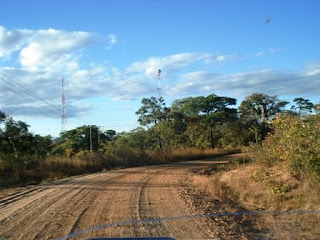



I delayed in posting this blog about my trip to Chama because I tried to research for information about the socio-demographic characteristics of the place but I failed to get any from government websites until I resorted to checking the free encyclopedia on line, Wikepedia.
According to Wikepedia, Chama is a small town in the Eastern Province of Zambia. It is one of the most remote headquarters in the country, lying just inside the eastern edge of the upper Luangwa Rift Valley, at the foot of the highlands dividing Zambia and Malawi. Chama District is the most northerly, largest and least-populated district of the Eastern Province and includes a large wilderness in the Upper Luangwa valley just north-east of the North Luangwa National Park. Much of the population of Chama District lives close to the Malawi border and shares tribal and cultural links with the people of the northern highlands of that country. The people of Chama belong mostly to the Senga tribe. Members of the Tumbuka tribe also live in Chama. Chisenga, a language similar to ChiTumbuka and Chichewa or Nyanja, is the predominant language spoken.
Agriculture is the leading industry, and maize is the most common crop. Chama is also known as a rice-growing area. Cotton is a lucrative crop for some. Sorghum and soya beans are also grown. Other common food crops include groundnuts, sweet potatoes, pumpkin, cabbage, sunflowers.
Wonderful description of Chama from Wikipedia! Information found in the said article was amazing because they were all accurate. They may sound very general but that’s the normal way I describe a place. I travelled almost 300 kilometers from Chipata through dirt road, wherein my clothes and the white land cruiser turned brown in color because of the cloud of dust.
Chama is where I get my rice, apart from being cheap, the quality is good with a nice aroma and with my rice cooker- the quality of cooking really turns appetizing. In Zambia, one thing I realized was there is no sense of time. In fact, very few people wear wrist watch which is a good rest for me since it’s very relaxing and distressful. However, I hate this culture when it’s time for eating. Filipinos love eating and delay feeding them will result to all sorts of negative reaction from people. But I have witnessed in Zambia or in the districts in Chipata that they don’t mind if they eat late as long as at the end of the activity there is food. On the same occasion, lunch was served at 3PM. I looked forward to eating boiled rice especially prepared for me. I took my first serving but the man beside me shared the rice with me and he took his second serving without using a serving spoon which discouraged me from taking my second-serving. Lesson learned?: the first time you get food, get more than enough serving that you can take, otherwise having such delayed lunch will end up in unsatisfied eating. Moreover, if you are embarking on another long journey, better make yourself full.
Another interesting activity I witnessed was a mobile commercial store as depicted in the photo. It was a closed van which contained so many products from mugs to iron sheets. As I waited for the rest of the staff to finish their lunch, I was looking at people buying tin cups, plates, cooking pots, iron sheets while the storekeepers are slowly getting them inside the truck. According to people, the truck comes once a month which gives ample time for people to save money and buy stuff. While I was busy enjoying the movements of people, a man approached me asking for money. Automatically, I refused saying that I don’t give away money. This is one common misimpression about foreigners; dollar sign is seen on our foreheads. If they only knew, I am also a volunteer who relied on allowance to survive in Zambia although humbling to say that it is like paid job according to local standards.
After saying all the goodbyes, we started back our journey to Lundazi to stay for the night before proceeding to Chipata the next day. It was a rewarding trip because I always get affirmation that I am glad to be a Filipino and I am happy that Philippines is my country.
No comments:
Post a Comment